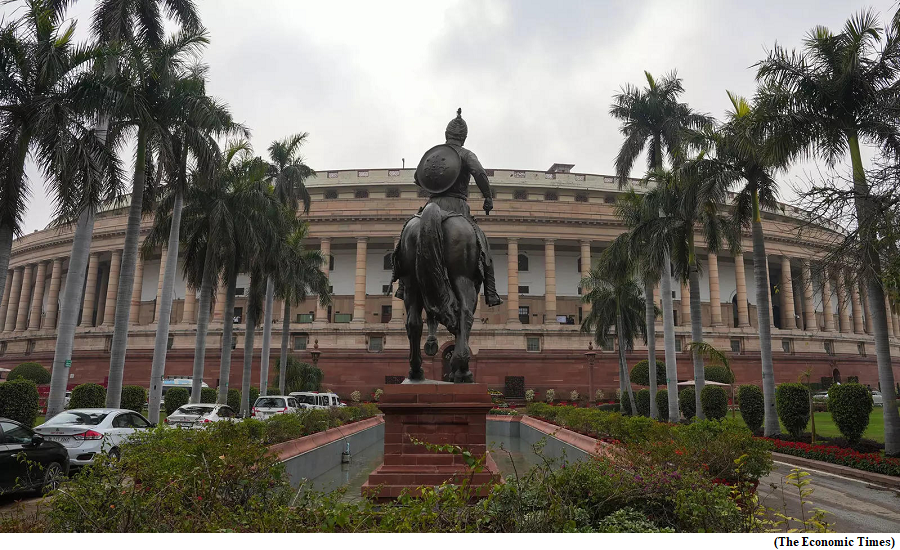The demand for Scottish independence (GS Paper 2, International Relation)

Why in news?
- Recently, the British Prime Minister Rishi Sunak was quick to reject a call from the new First Minister of Scotland and leader of the governing Scottish National Party (SNP), Humza Yousaf, to hold a second referendum for Scotland’s independence from the U.K.
Background:
- The independent Kingdom of Scotland was formed in the 9th century and went on to fight wars to remain independent from the Kingdom of England. In 1603, the two kingdoms entered a personal union and were then ruled by the same monarchs.
- In 1707, due to economic and political vulnerabilities prevailing on both sides, the British and Scottish Parliaments passed the Acts of Union, entering into a political union under the name of Great Britain.
- While Scotland could retain some of its decision making powers it did not get equal representation in the united Parliament, and longstanding cultural and political differences remained.
- Demands for self-governance soon began to sprout, eventually leading to two referendums in 1979 and 1997, resulting in the formation of a new devolved Parliament of Scotland in 1999.
- This Parliament was given the mandate to form legislation on devolved issues such as health, transport, education, and so on, while the power to legislate on defence, foreign policy, trade, immigration, and currency was reserved.
- The last referendum for independence took place in 2014, where 55% of Scots voted to stay in the three-centuries-old union while 45% voted to walk out.
- Scotland accounts for 8% of Britain’s population and economy and one-third of its landmass.
What role has the SNP played in the pro-independence movement?
- The Scottish National Party was formed in 1934 with the merger of two parties who had been demanding the devolution of powers — the National Party of Scotland and the Scottish Party.
- The SNP won its first seat in the British Parliament located in Westminster in a by-election but the MP refused to take up his seat.
- The party then began circulating petitions for the creation of a devolved Parliament and came to national prominence in 1967 with Winnie Ewing taking the Hamilton seat from the Labour Party.
- While a major political victory was still elusive, it was in the 1970s, after oil was discovered in the North Sea, that SNP ran a popular campaign in line with its central ideology of independence.
- With the iconic slogan “It’s Scotland’s Oil”, the party argued that if not for Britain’s control over reserved matters, proceeds from the oil would have benefited the Scottish economy and consequently the Scots. The party managed to get 11 MPs elected to British Parliament in the 70s.
Why the demand for independence?
- The SNP government says that people who live in Scotland should have the right to decide if they want to be an independent country. To relinquish doubts over the future of Scotland after independence, the SNP has been coming out with White Papers on its vision for “building a new Scotland”.
- It currently gets a bloc grant from the British government for a large part of its annual expenditure which it plans to substitute with oil revenues from the North Sea once its gets independence.
- It says that instead of using the North Sea oil revenues to invest in future generations, the U.K. is using them to fund its current expenses, which undermines the interests of Scots.
- It also plans to rejoin the EU, to expand its trade in the bloc, and to receive other associated benefits. The SNP also plans to keep using the British pound Sterling as its currency after independence.
- It also believes that the U.K. could make other decisions like Brexit in the future that would undermine Scottish interests.
What is the U.K.’s stand?
- The British government believes that the SNP has failed to give a clearer picture on how issues of pensions and healthcare would work in an independent Scotland. It has also warned Scotland that if it rejoins the EU, it would lead to the creation of a hard border between Scotland and Britain.
- Before the 2014 referendum, the Economic Affairs Committee of Westminster had highlighted that the retaining of the sterling as Scottish currency would be problematic as the Monetary Policy Committee of the Bank of England, which forms policy for the U.K., could not entertain the interests of a separate country.
- It also said that Scotland would find it difficult to assume its share of U.K.’s public debt, which runs into billions.
- Besides, the decommissioning of North Sea Oil would also have economic and trade implications for Britain.
What lies ahead?
- Mr. Yousaf has expressed that he is not wedded to the idea of the “de facto referendum”. His priority is to first build support for independence among Scottish citizens.
- Recent polls show that the support for a ‘yes’ vote on independence has dropped to 39% in the country, less than it was during the 2014 referendum.
Parliament clears amendments to competition law without any discussion
(GS Paper 3, Economy)
Why in news?
- Recently, the Parliament cleared the amendments to the Competition Law that will pave the way for promoting the ease of doing business as well as enhance the framework to deter entities from indulging in unfair business practices.

Background:
- The bill has been approved by Parliament nearly eight months after its introduction in Lok Sabha, which gave its nod on March 29.
- The bill was also referred to the Parliamentary Standing Committee on Finance, which tabled its report in Parliament on December 13, 2022.
Key Highlights:
Assessment time frame:
- To ensure time-bound clearance of combinations, CCI will have to complete its assessment within 150 days instead of existing 210 days from the date of filing of combination notice by the parties.
- Also, prima facie opinion has to be formed within 30 days from the receipt of the notice, otherwise the particular deal will be deemed as approved.
Mergers:
- In CCI parlance, combinations refer to mergers and acquisitions.
- Besides, a size of transaction test will be introduced in terms of 'value of transaction' as a criteria for notifying combinations.
- All deal values involving acquisitions, mergers and amalgamations exceeding Rs 2,000 crore having target enterprise in India should be notified to CCI for approval before their consummation.
Settlement and commitments framework:
- A green channel route will be introduced for certain combinations which shall be eligible for deemed approval in a trust-based framework.
- A leniency plus framework will be put in place to incentivise the parties in an ongoing cartel investigation to disclose information regarding other existing cartels.
- In addition, there will be a settlement and commitments framework in cases of abuse of dominance and anti-competitive agreements (except for horizontal agreements). In case of settlement, compensation can be claimed by the third parties, if aggrieved, as per the ministry.
- While the scope of the law will be widened to include agreements other than vertical and horizontal agreements which are anti-competitive in nature, there will also be a three-year limitation period for filing information before CCI to ensure that only genuine cases that adversely affect competition are considered by the regulator.
Imposition of penalties:
- Once the bill comes into force, CCI will have powers to impose penalties on entities based on their global turnover instead of the current practice of considering only relevant market turnover.
Appointment of DG:
- One of the amendments is that the power to appoint Director General (DG) will be vested with CCI instead of the central government to bring in more operational and administrative efficiency in the functioning of the regulator.
- However, such appointment will be after the prior approval of the central government as a check and balance and to ensure independence of the working of the office of DG.
Other amendments:
- Keeping in view the concerns of the Parliamentary panel, the definition of agent in the bill is being modified through official amendments. Thus, only persons employed as legal advisors by persons under investigation may be called for examination in course of investigation by the DG.
- CCI may also issue guidance notes on matters, including manner of calculation of penalty that may be imposed for contravention of the provisions of the Act, for greater transparency and certainty in its enforcement practices.
CCI Act:
- It will be the first time since the enforcement of the Competition Act in 2009 that amendment will be made to the Act.
- The Act was brought in 2002 and subsequently, it underwent amendments in 2007 and 2009. In May 2009, the anti-trust provisions of the law came into force and two years later in May 2011, CCI started screening mergers and acquisitions.
One in six people worldwide affected by infertility, finds WHO
(GS Paper 2, International Organisation)
Why in news?
- Recently, the World Health Organization (WHO) report titled, ‘Infertility Prevalence Estimates, 1990–2021’ was published.
- It reported that at least one in six people worldwide are infertile, advocating for better access to fertility care essential for global health. The rates are “comparable” for high, middle and low-income countries.

What is infertility?
- Infertility, which affects men and women, is a reproductive condition defined by the failure to achieve a pregnancy after 12 months or more of regular unprotected sexual intercourse.
Key Findings:
- About 17.5 per cent of the global adult population is affected, the WHO found after analysing all relevant studies on infertility from 1990-2021 to compile the new in-depth estimates.
- The magnitude of infertility as a global public health issue has been underlined by the report and showed an urgent need to expand access to prevention, diagnosis and treatments.
- Understanding the magnitude of infertility is critical for developing appropriate interventions, for monitoring access to quality fertility care and for mitigating risk factors for and consequences of infertility.
Challenges:
- The prevalence of infertility, diagnosis and treatment such as in vitro fertilisation (IVF) remain underfunded and patients find themselves priced out.
- People in the poorest countries spend a greater proportion of their income on fertility care than those in wealthier countries. Infertility is also linked to “distress and stigma”, as well as an increased risk of intimate partner violence.
- Millions of people faced catastrophic healthcare costs after seeking treatment for infertility and all too often, a “medical poverty trap”.
Way Forward:
- Fertility care is a core part of sexual and reproductive health and responding to infertility can mitigate gender inequality.




